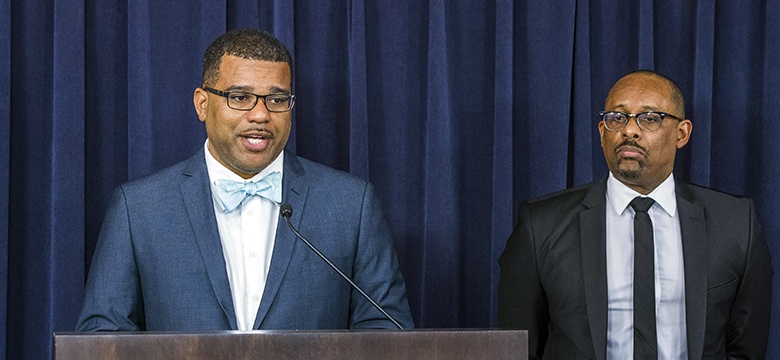
Thank you for taking time this afternoon to come and learn about the most recent Cambridge International assessment results for students in the Bermuda Public School System. Joining me today is the Department of Education Director of Academics, Dr Llewellyn Simmons.
This press conference will focus on an overview of the international assessment results for the 2016 – 2017 school year. In the past we’ve reported the results in October, however, the technical staff at the Department of Education have taken time to prepare a more parent-friendly and community-friendly report that is now available online on the Ministry’s website. Today, we will share the Cambridge Checkpoint results for primary and middle schools and the results for the IGCSE examinations which students sat last school year.
It should be noted, the Cambridge Checkpoint assessment is a diagnostic assessment with the sole purpose of providing students and teachers with specific feedback about each student’s strengths and deficits in relation to the essential skills and knowledge for each of the core subject areas of English, math and science.
The information from the Cambridge Checkpoint assessment is intended to be used to develop individual learning plans geared towards helping students to acquire the requisite knowledge and skills.
Our Primary 6 and Middle 3 students were assessed in the areas of English, math and science using the Cambridge Checkpoint assessment. This is an international assessment administered in over 170 countries by private schools who select which students write these assessments. The Bermuda Public School system is the only public school system in the world to use Cambridge to administer these assessments system-wide.
The Results:
Over 300 Primary 6 students were assessed with the Cambridge Checkpoint assessment with an expected cohort average target of 3.0 on a scale of 1.0 to 6.0 for English, math and science.
Let me first say that I am very pleased to report that our P6 students, as a cohort, exceeded the target of 3.0 in the areas of English and science. Furthermore, the results for English were significantly close to the Cambridge International average score, indicating students are close to being on par with their international counterparts.
However, our Primary 6 students did not meet the 3.0 target for mathematics. Students’ scores were also notably below the Cambridge International average score for mathematics. These results indicate a need to continue to focus our attention on improving math scores.
Our M3 students were also assessed in the areas of English, math and science. We are disappointed that this cohort scored just below the 3.0 target for English and science. There is much to do in this area, however, we are confident that with the new Strategic Plan results for English and science will improve.
I will now speak to the IGCSE results, students at the senior level must take the IGCSE for English, math and science as a requirement for earning the Bermuda School Diploma (BSD). Students must earn a grade between A* and G. Using this band of grades, 97% passed English, 92% science and 72% mathematics.
We also examined IGCSE results for the percentage of students falling in the A* to C band. The results for this band of grades drop significantly in all three subject areas.
Overall, these results indicate the need for targeted efforts to improve mathematics at the primary, middle and senior middle levels.
Next Steps:
- We have already received from Cambridge a comprehensive analysis of our students’ performance on the math Checkpoint assessments. This data has been used to develop a professional learning strategy for teachers which will commence next month.
- In March teachers will participate in workshops designed to address student deficits and teams consisting of members from the Department of Education and Cambridge will conduct walkthrough observations to gain first hand data about teaching and learning experiences in our primary, middle and senior schools. Cambridge International staff will then share the observation data with principals and teachers and advise on the mathematics teaching strategies to best address any observable deficits.
- The Department will undertake the recruitment and hiring of three education officers in math, science and reading to provide the supervision and monitoring of the curriculum implementation.
- This school year the roll-out for Strategic Plan 2022 will commence and the strategies will lay the foundation for the future work needed to improve Checkpoint scores.
In closing, the data indicates the need for schools and teachers to work collaboratively, intentionally and persistently to implement strategies to improve students’ mathematics results. Students must also make a concerted effort to improve their performance and parents must work in concert with schools and support wholeheartedly the efforts of the schools and teachers. The Department of Education staff must also provide the resources, professional development and support. The gains and improvement are evident when all four stakeholder groups work together to improve the results.
This Government is committed to ensuring a quality education for all students and for ensuring accountability for an improvement in our results as we implement Plan 2022.
